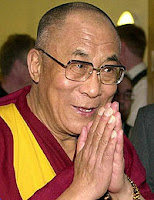Last Monday, our pet rabbit “Daisy” died and, just two days later, our other rabbit “Floppy” died. The fact that these sudden deaths came only a few days after my entry on impermanence was a poignant reminder that the temporal nature of physical existence was not merely an abstraction but a daily and tangible reality. However, I felt strangely saddened by the death of Daisy and Floppy as if I had developed a special relationship with these creatures. I also must have grown used to seeing them every day and, in many ways, grew attached to a life that included them.
If I think about it, we do have a peculiar rapport with animals. Some animals we would eat without question - unless you’re a vegetarian, and, a few chosen ones we consider “pets”. In fact, we also name our animals using a variety of names ranging from the creative, to the mediocre the exotic. But, most wouldn’t identify with the pig that gave them their bacon, the cow that gave them their beef, or the chicken that gave them their chicken nuggets. Thus, the leap that turns animals from food to pets is, in so many ways, simply an artificial product of the mind. In the real world, there is no distinction between the cat and the cockroach, the dog and the fly.
Why do I choose cockroaches and flies? Because I admit, I had an irrational fear of roaches since I was younger and well, flies, are annoying. But, then, as I reflected about my perceptions on other animals and living beings, we think of some animals as worthy of our love, care and attention, only if they fulfill our purposes and needs. As a consequence, life becomes of value depending on the role we impose on living creatures.
However, if one claims to believe in animal rights by opposing animal cruelty, abuse or testing, one is only partly addressing the issue. In the West, for example, we tend to have an idea of ourselves as mostly in favor of animal welfare. But, which animals are we talking about? Isn’t the list of animals that we purport to “defend” defined by our culture and beliefs. As a result, by defining which aninals are worthy of rights and which are not, we are replicating the conviction that as human beings we have a dominion over the world and its creatures.
I don’t mean to judge or make readers feel guilty about the attitudes we have to life. I just wanted to express my inner concerns as I meditate on the sudden death of two rabbits that I grew attached to. If these were just any other rabbits, honestly, I might have eaten them in a stew. In Malta, we do eat rabbit once in a while. And that makes me wonder whether the distinction I thought existed between food and pets is really real or just a fabrication like so many concepts and ideas we have of the world. The fact that I still consume meat is problematic now as well.
For inasmuch as we think we are better than animals and other living beings, we will have to die like the rest of them. And while we may have greater self-awareness than other living creatures, we still are too immersed in our individual bubbles without appreciating the essential inter-dependence of worldly life and the essential nature of who we are.


